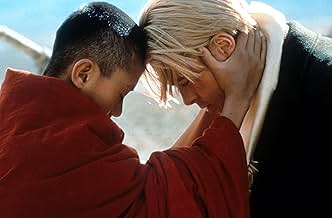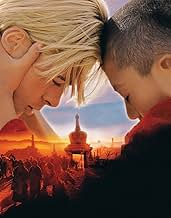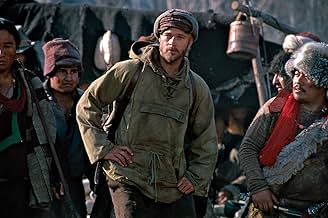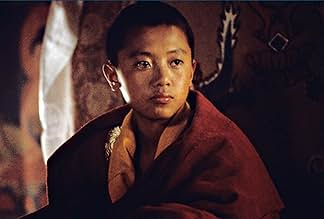Le parcours de rédemption dHeinrich Harrer, un alpiniste adulé en Allemagne, ayant en 1939 délaissé sa femme enceinte pour lHimalaya. Au terme dun périple il se dévouera à un enfant, le Dala... Tout lireLe parcours de rédemption dHeinrich Harrer, un alpiniste adulé en Allemagne, ayant en 1939 délaissé sa femme enceinte pour lHimalaya. Au terme dun périple il se dévouera à un enfant, le Dalaï-Lama, jusquà lappropriation brutale du Tibet par la Chine. [255]Le parcours de rédemption dHeinrich Harrer, un alpiniste adulé en Allemagne, ayant en 1939 délaissé sa femme enceinte pour lHimalaya. Au terme dun périple il se dévouera à un enfant, le Dalaï-Lama, jusquà lappropriation brutale du Tibet par la Chine. [255]
- Réalisation
- Scénario
- Casting principal
- Récompenses
- 3 victoires et 8 nominations au total
- Ngawang Jigme
- (as B.D. Wong)
- Lord Chamberlain
- (as Ven. Ngawang Chojor)
Avis à la une
On the acting side, Brad Pitt was not quite totally believable as a German but, accent-quibbles aside, he did inhabit the character in a way that was compelling and interesting. I thought the supporting cast of Mako and (mostly) Tibetan unknowns was good and the use of these unknowns added credibility to the movie.
The scenery was as beautiful as you would expect it to be -- breathtaking shots of the Himalayas dominating throughout much of the movie.
It needs about 2/3 of the time to show what a bad guy Heinrich Harrer actually is and only 1/3 of the time to show how he changes and gradually becomes a good man. All he thinks about is his career as a mountain climber. In 1939, just before World War II, his wife is pregnant with their first child. Harrer doesn't want to take up his responsibility and 'flees' from her by going to Tibet, where he will try to conquer Mount Nanga Parbat in the Himalayas. Because he is an Austrian and because the Nazi's already have taken over power in Austria, they will use his successes to prove that the Germans are the best race (I hope I don't have to explain the entire Nazi ideology to you, but that you paid enough attention during history class). During his attempt to reach the summit he is arrested by the British and taken to a POW-camp. After several attempts to escape he finally succeeds and together with Peter Aufschnaiter he succeeds to reach Tibet. First he is his old, bad self, but gradually he changes his lifestyle and becomes more 'Tibetan'. He even knows to get the attention of the very young Dalai Lama and becomes friends with him during the period that the Chinese took over power in Tibet.
I don't know if all that is shown in this movie actually happened or to which extent some parts have been made up. Of course it is all a bit politically 'colored' (the Tibetan question is still not solved until today and so there will always be people who will choose China's side and say that what is shown here is completely wrong), but that doesn't mean that this movie doesn't carry a powerful message. But even without this message of being a good husband and not being a career driven jerk, the philosophical Tibetan approach to problems... this movie is very nice eye candy. The landscapes are absolutely stunning and Tibet really looks like a place that certainly is worth a visit. The acting is very good and it all looks very believable.
So despite the fact that this movie dragged on from time to time and that it should have been a bit shorter, this still is a very nice film. I give it a 7/10, perhaps even a 7.5/10.
Again, it is far from perfect, but watch it and try to see where I'm coming from. If you do not share my sentiments then, at least Brad Pitt's excellent acting and the gorgeous cinematography will keep your interest.
Brad Pitt is Harrer in Seven Years In Tibet and this has become my favorite film of his. Heinrich Harrer, a world famous mountain climber and Austrian national hero goes on an expedition in 1939 to conquer an unclimbed peak in the Himalayas. While he's doing his mountain climbing Germany of which Austria is now part of marches into Poland and World War II begins. Harrer and his party are interred as enemy aliens.
In 1942 Harrer escaped and he and a friend played by David Thewlis make their way into Tibet. The rest of the film is the seven years he spent there, centered around the unique friendship he formed with the child ruler of Tibet, the Dalai Lama. This in fact is the same Dalai Lama who today is possibly the world's greatest and non-aligned apostle of the gospel of peace.
Brad Pitt is never better in the film than he is with the three child actors who play the Dalai Lama at various stages of his life. The physical hardship that he and Thewlis endure just getting into Tibet is adventure enough. But the spiritual journey he undergoes in his time there makes this one of the most unique adventure stories of the last century.
One thing I liked about Seven Years in Tibet is that no effort was made to cover up Harrer's Nazi background. In an alternate universe one can speculate on what might have happened to him had he actually had to serve in the army in World War II. His internment saved him from possibly being involved any number of atrocities. God, fate, some kind of higher power saved him for something wonderful.
The cinematography is breathtaking, this film had an incredible number of locations. Note that it was shot in British Columbia, in Argentina with the Andes serving as the Himalayas, Austria and even some establishing footage was shot in Tibet itself on the sly.
Tibet's status is unique unto the world. It has been part of China since the Ming dynasty. It's referred to properly as the autonomous region of Tibet. China has given it autonomy in varying degrees over the past several centuries, it's never been truly independent. The Communist regime back in the days of Mao Tse-tung brutally asserted it's sovereignty a few times, most notably in late fifties when the Dalai Lama was forced to flee Tibet and live in Northern India where he resides to this day. That is when he's not traveling the world as it's foremost advocate of non-violence.
It is sad that this film did not get more box office than it did. Brad Pitt, David Thewlis, director Jean Jacques Arnaud are all persona non grata in the People's Republic of China for making this film. Quite a market indeed to be shut out of for a stand for humanity.
It's to be hoped that one day the Tibetans will be free. Until then they have their unique brand of Buddhism to sustain them and this wonderful film to tell their story.
Le saviez-vous
- AnecdotesJetsun Pema is the real-life sister of The Dalai Lama. In this film she plays the mother of The Dalai Lama and hence her own mother.
- GaffesThe movie depicts the Dalai Lama's coronation occurring after Germany surrenders in WWII and after China invades Tibet. The actual enthronement ceremony took place on 22 February 1940, (Iron-Dragon Year, 1st month, 14th day), long before the end of the war and the Chinese invasion. On 17 November 1950, the Dalai Lama assumed full temporal (political) power over Tibet which was more than 10 years after his enthronement ceremony.
- Citations
Dalai Lama: We have a saying in Tibet: If a problem can be solved there is no use worrying about it. If it can't be solved, worrying will do no good.
- Crédits fousAs the end credits roll, a view of the mountains of Tibet is seen.
- Bandes originalesPurification Et Benediction
Performed by Monks of Namgyal Monastere
Meilleurs choix
Détails
- Date de sortie
- Pays d’origine
- Site officiel
- Langues
- Aussi connu sous le nom de
- Siete Años en el Tíbet
- Lieux de tournage
- Sociétés de production
- Voir plus de crédits d'entreprise sur IMDbPro
Box-office
- Budget
- 70 000 000 $US (estimé)
- Montant brut aux États-Unis et au Canada
- 37 957 682 $US
- Week-end de sortie aux États-Unis et au Canada
- 10 020 378 $US
- 12 oct. 1997
- Montant brut mondial
- 131 457 682 $US
- Durée2 heures 16 minutes
- Couleur
- Mixage
- Rapport de forme
- 2.39 : 1
Contribuer à cette page




































